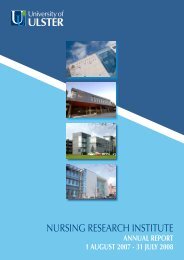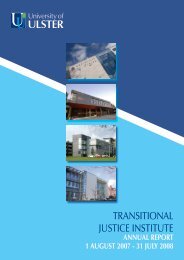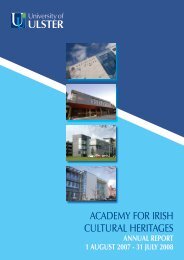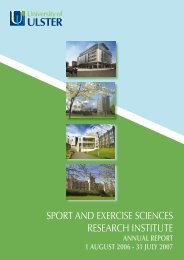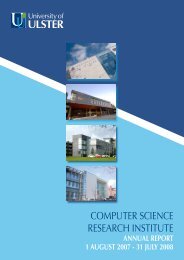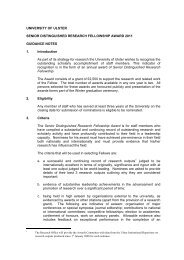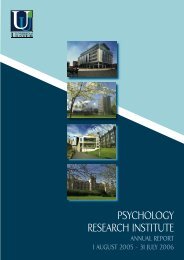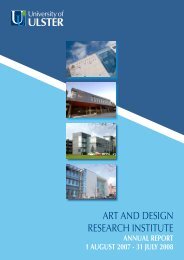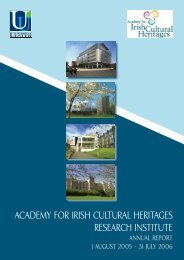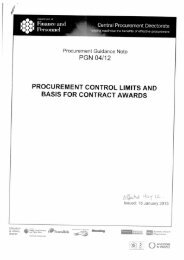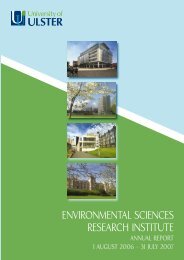academy for irish cultural heritages - Research - University of Ulster
academy for irish cultural heritages - Research - University of Ulster
academy for irish cultural heritages - Research - University of Ulster
You also want an ePaper? Increase the reach of your titles
YUMPU automatically turns print PDFs into web optimized ePapers that Google loves.
4. Staff Biographies<br />
Pr<strong>of</strong> Paul Arthur<br />
Paul Arthur is a Pr<strong>of</strong>essor <strong>of</strong> Politics and Director <strong>of</strong> the Graduate Programme in Peace and Conflict Studies at<br />
the <strong>University</strong> <strong>of</strong> <strong>Ulster</strong>. He holds a BA and MSSc from Queen’s <strong>University</strong> Belfast and a D.Litt. from the National<br />
<strong>University</strong> <strong>of</strong> Ireland. He is the author <strong>of</strong> five books - the latest being Special Relationships: Britain, Ireland and the<br />
Northern Ireland problem (2001) - and circa seventy peer-reviewed articles. He has extensive media experience<br />
in Ireland, Britain and the United States including two years as an op-ed writer <strong>for</strong> the Irish Times as well as being<br />
<strong>Ulster</strong> Television’s regular political analyst. He has contributed to the Times, New York Times, Observer, Sunday<br />
Independent and Guardian.<br />
He has lectured extensively in Europe and the United States. In 1997-98 he held a Senior Fellowship at the United<br />
States Institute <strong>of</strong> Peace (USIP) in Washington DC where his research was in Track Two Diplomacy. He has also<br />
held the Jefferson Smurfit Distinguished Fellowship in Irish Studies at the <strong>University</strong> <strong>of</strong> Missouri (2000). He has<br />
acted in a consultancy capacity <strong>for</strong> the United Nations <strong>Research</strong> Institute in Social Development (UNRISD) on<br />
political violence, and the Northern Ireland Affairs Committee at the House <strong>of</strong> Commons on an enquiry on<br />
“Dealing with the Past”. He sits on a number <strong>of</strong> International Advisory Boards including the “Project on Justice in<br />
Times <strong>of</strong> Transition” in New York, “Fusion” in Bogota, “The Global Majority” in Monterey (Ca), and the William<br />
Jefferson Clinton Institute in Dublin. He has been involved in a series <strong>of</strong> problem-solving workshops in Colombia,<br />
Guatemala, Sri Lanka, Palestine and Macedonia. In the past year he has been involved in background discussions<br />
with the Prime Minister <strong>of</strong> Sri Lanka and delegations from Georgia, Iraq and Israel/Palestine when they have visited<br />
Northern Ireland.<br />
Since 1990 he has participated in many Track Two initiatives with Northern Ireland’s political parties in Europe, the<br />
United States and South Africa.<br />
Dr Allan Blackstock<br />
Allan Blackstock was born in Belfast where, after a working in industry, he entered third level education as a<br />
mature student. After graduation, he worked <strong>for</strong> a period as an archivist in the Public Record Office <strong>of</strong> Northern<br />
Ireland and has also provided historical consultancy <strong>for</strong> various museums. He taught at Queen’s <strong>University</strong> Belfast<br />
(QUB) in the School <strong>of</strong> Modern History and the Institute <strong>of</strong> Irish Studies be<strong>for</strong>e joining the <strong>University</strong> <strong>of</strong> <strong>Ulster</strong> in<br />
2002 where, in addition to conventional teaching, he has been involved in developing e-learning programmes in Irish<br />
Cultural Heritages. He was promoted to Reader in Irish Cultural Heritages in 2005. In 2001 he was elected Fellow<br />
<strong>of</strong> the Royal Historical Society and in 2006 to the editorial board <strong>of</strong> the <strong>Ulster</strong> Society <strong>for</strong> Irish Historical Studies.<br />
Qualifications<br />
He graduated with a BA (hons) degree in English and Modern History at QUB in 1988 where he also completed<br />
his PhD in 1993 and gained a Postgraduate Certificate in Education in 1995. He also attained an Adult and Further<br />
Education Teacher’s Certificate at the Belfast Institute <strong>of</strong> Further and Higher Education in 1990. In 2005 he gained a<br />
certificate in e-tutoring.<br />
<strong>Research</strong> Fields<br />
Loyalism in Ireland, 1789-1869<br />
Irish social and military history, c1770-1830<br />
Popular protest in Ireland and Britain, c1760-1850<br />
Sociability: Irish intellectual Clubs and Societies, 18th and 19th centuries.<br />
Book and publication history in Ireland<br />
Dr Elizabeth Crooke<br />
Elizabeth joined the <strong>University</strong> <strong>of</strong> <strong>Ulster</strong> in 2001 and is now Senior Lecturer in Museum and Heritage Studies. She



